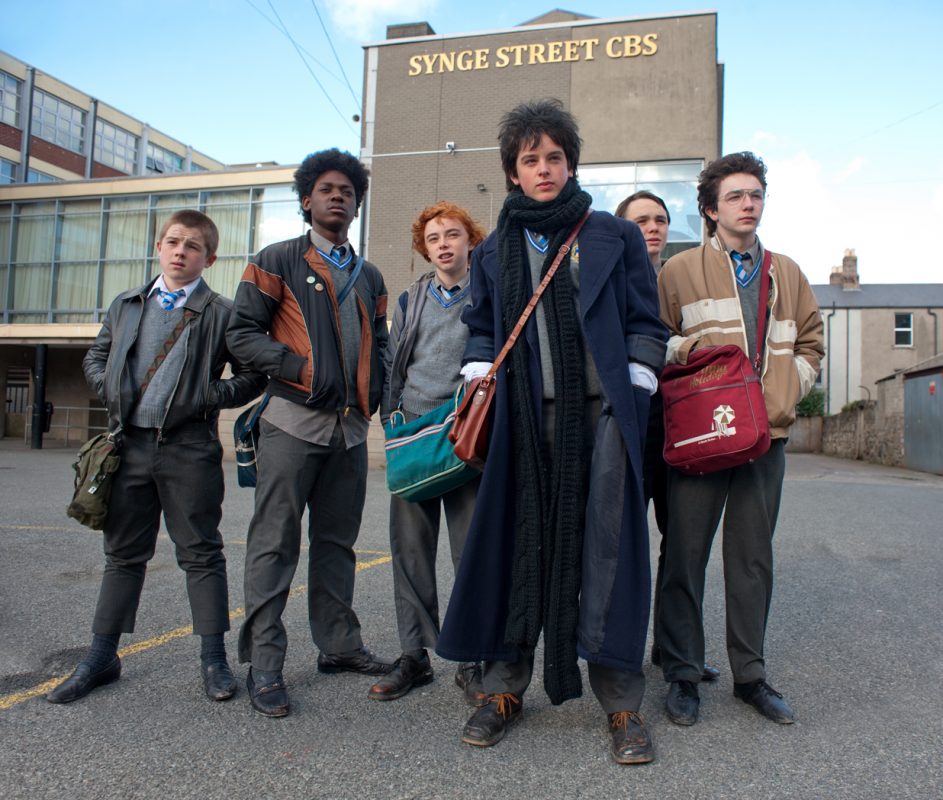
It’s a good thing that Sing Street is so darn loveable because it’s also one of the most curiously mild-mannered films I’ve ever seen. Things that might have great consequences in other films—divorcing parents! abusive headmasters! skin-head bullies!— are treated with all the urgency of a stubbed toe. This is possibly because our hero, 15 year old Conor (Ferdia Walsh-Peelo), is about as passive as they come.
It’s the mid-80s in Dublin and Conor is the new guy at a Catholic school. Unpopular and harassed by both the (mildly) abusive headmaster and the (mildly) intimidating school bully, he spies wannabe model Raphina (Lucy Boynton)—a high-school dropout living at a home for girls—and falls for her hard. In an attempt to woo her, he tells her she must appear in his band’s next music video. Now all he needs is a band.
Conor has an older brother Brendan, played by Jack Reynor (picture a hot Seth Rogen), a pot-smoking slacker who lives at home and seemingly has nothing to do all day but give his kid brother advice about music and girls and life. (Brendan was such an idealized character—the doting, cool-guy brother—that I briefly thought he was a figment of Conor’s imagination. But no, he’s real.) Conor also has a tiny, tomato-red-haired sidekick named Darren (Ben Carolan), who introduces him to the talented Eamon (Mark McKenna), an Elvis Costello-looking kid who has a thing for rabbits (a funny gag that the film randomly drops halfway through) and seemingly plays every instrument known to man (including the bagpipes). Two more boys see a flier and join in, another is recruited because he’s the only black kid at school (not quite as offensive as it sounds)—and suddenly they’re a band.
One of my biggest nitpicks with the movie is how quickly the band gets good. In particular Conor, who was so shy in front of Raphina he could barely choke out a few bars of a-ha’s “Take on Me” is suddenly a swaggering lead singer. But, on the other hand, if the band weren’t any good, the film would lose its greatest asset, namely the fun, original music which perfectly mimics the pop and New Wave hits of the day. In an amusing conceit, Conor is instantly influenced by whatever band he’s heard last, both in terms of musical style and dress. After hearing Duran Duran, Conor adopts a dandyish, New Romantic look. After hearing the Cure—perfectly described by Brendan as “sad happy music”—he spikes his hair and wears black eyeliner. An introduction to Hall & Oates suddenly gives the bad more an R&B vibe. The videos they attempt to make are hilarious, low-rent imitations of the real deals that were so popular on Top of the Pops, the BBC’s answer to MTV.
Sing Street flaunts its influences rather proudly: There’s a touch of Rushmore, a sprinkle of Freaks and Geeks, a large dose of Almost Famous, and, inevitably, a bit of The Commitments, Alan Parker’s 1991 film about another budding Irish band.
As Conor, ruddy-cheeked newcomer Walsh-Peelo is instantly appealing, even if the diffidence of his character often made him hard to read. If he was upset that his parents (Aidan Gillen and Maria Doyle Kennedy) were divorcing, or the fact that he was being bullied at school, it barely registered. He’s more compelling in the scenes where he’s idolizing his big brother, collaborating with Eamon (the Lennon to his McCartney, if you will), or gazing adoringly upon Raphina, who likes him mostly as a friend.
Sing Street is a shaggy, uneven, but undeniably endearing and entertaining film, especially if this was the music of your childhood, as it was mine. It fails (rather miserably) at being a gritty and realistic look at working class life in Dublin, but it certainly succeeds at being a crowd-pleaser.
